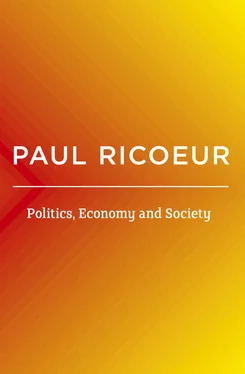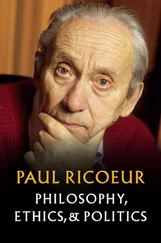The Economic Level: Planning
I will begin by defining an initial, purely economic, level of socialism. By socialism, we understand the passage from a market economy to a planned economy, subordinated to human needs and accompanied by a transfer of ownership of the means of production to collective or public entities.
This definition contains three aspects: it is their union that allows us to speak of socialism.
1. By market economy is to be understood an economy in which the regulation of production and consumption occurs on the basis of profit and financially solvent need. A planned economy is one in which economic decision-making no longer depends, in the final analysis, on the ownership of goods but belongs to instruments of common interest, an economy in which the fundamental motive is the maximum satisfaction of actual needs, following an order of urgency. From this angle, socialism marks the conquest of the economy by rationality, by the very rationality that first operated in technology and in science. In the regime of planning, economic reality is “constructed,” as it were, by forecasts and decisions.
When can we speak of socialist planning?
The question is not as straightforward as it may seem. The concern with rationality has existed and still exists outside of socialism: post-war Keynesian interventionism did not challenge the private ownership of the means of production but only advocated rational adjustment of State interventions (monetary policy to encourage expansion, the prudent growth of public investment, the redistribution of revenue, etc.). Between this interventionism and socialism properly speaking, there is an entire range of forms of economic regulation, characterized by diverse efforts to rectify the most damaging effects of the capitalist economy based on national financial data. Among this vast range, there are all sorts of therapeutic interventions, functional plans, limited forms of planning, respectful of the structures and institutions of the capitalist system; some concern only categories of goods, others, areas of activity. The forecast then concerns the various means of balancing the economy which are possible on the basis of diverse political choices. In this way, planning can coincide with an economy that could still globally be called a market economy. In these systems, which are mixtures of injunctions and spontaneous economic activity, basic needs are no longer satisfied on the basis of solvency; the motive of social utility wins out over the profit motive. Profit can itself undergo partial socialization in the form of a reapportionment of profits or by means of fiscal policies, or finally through social programs.
The danger of these mixed economies is their incoherence. Two forms of logic vie for dominance: the logic of collective advantage and the logic of the advantages of private individuals. Public enterprises lean toward imitating private corporations and pursuing, as they do, private sector ends. Moreover, if the State is not controlled by workers, but by representatives of the non-nationalized part of the economy, the capitalist mentality will continue to be expressed, even in the heart of the public sector. Finally, there is the fear that when planning has been stripped of its social aim, it will simply be a means in the service of a purely cybernetic guidance of the economy, a pure technology of equilibrium and expansion, foreign to any concern for real human beings. This is why a second feature has to be added to the simple definition in terms of economic rationality.
2. The second feature is the reference of the economic project to human need. This requires us to speak of a change in structure and in mentality and not simply of a change in function; a global strategic vision of economic action replaces the standpoint and the interests of small economic units. A clear vision of global priorities and decisions concerning human beings dominates the economic project. Thus, already on this level, the humanist aspect of socialism is announced, something we will return to in conclusion. The macro-decisions of the planners necessarily have an ethical character: whether to favor cultural goods over material goods, consumption over investment, etc. So many questions that fundamentally concern the fate of human beings.
3. Third feature: the collective appropriation of the means of production. This was the main point in the eyes of the founders of socialism. Why this change? Why is it that the collective appropriation of the means of production that previously was a goal is today no more than a means? Socialism’s founders spoke of a theory of alienation, centered on the idea of the direct exploitation of labor by the owner of capital (the Marxist theory of surplus-value is the best example of this theory of alienation). Property thus appeared as the immediate means of the expropriation of the laborer, deprived of the product of his work. Appropriating the means of production immediately appeared as an expropriation. In this way, the most proximate aim of socialism was the expropriation of the expropriators: property is theft, Proudhon said. Today we are less sensitive to the direct effects of the right to property, to the immediate consequences of the legal status of the ownership of the means of production: the emphasis has shifted to the influences of ownership on the power of decision-making. In this respect, property appears to be an obstacle in two ways: it is first an obstacle to governance in the general interest. The irrational intervention of profit and financially solvent needs stands in the way of reaching significant and regular rates of expansion. Under this first aspect, property is criticized in terms of a purely technocratic argument as an irrational economic phenomenon. On the other hand, property is responsible for distorting planning, moving it in the direction of a pure technology of equilibrium and expansion. This second argument has a more humanistic bent than the former one: property is an impediment to bringing out the properly socialist motive of the maximum satisfaction of human needs. But in both forms of the argument, property appears less as an instrument of direct exploitation than as an obstacle to the rationality of the plan and to the prevalence of the human motive over the technocratic motive.
Such is the appearance of socialism to us from this first perspective. It is the idea that a system driven by the motive of social gain is more rational than one delivered over to the competition of economic units each pursuing its own profit. Socialism then appears as the system that best allows calculating the interest of the community taken as a whole.
The Social and Political Level: Democratic Governance
Socialism also has to consider the standpoint of governance, that is to say, the participation of the greatest number of individuals in economic decision-making. At this level, what is at issue is the realization of democracy in the economy; socialism’s ambition is to reintegrate human beings into economic and social mechanisms. Indeed, the will to satisfy human needs in the most rational way is not sufficient to define socialism. As we well know, the often vague aspiration toward a more just, more egalitarian, more communitarian society is the true soul of socialism. But this second objective lags far behind the first. Everywhere rationality is on the march, but nowhere has the participation of the greatest number in economic decisions made progress. On this level, socialism is entirely to be instituted. And yet, from the very beginning, socialism has stood against the administration of things by a technocratic oligarchy in the manner of Saint-Simon and has aimed at a democratic administration of things, exercised in the name of the masses and controlled by them. Today we are more lucid in this respect, because we have before our eyes various pathological expressions of planning, and first of all Stalinist pathology. The question is whether the Stalinist teratology is exemplary or accidental. Can it be ascribed to planning as such or to circumstances particular to Russia, to the initial poverty of that country, to external threats, to the imperative of too-rapid industrialization, to the political ideology of dictatorship, to the personality of the dictator himself, to the absence of a democratic past? The question remains; it is not erased by remarking that capitalist industrialization was itself extremely costly. The risks and the cost, both political and human, of socialist planning have to be weighed. Doubtless, the illusion that Marx still nourished when he was writing The Poverty of Philosophy has to be dispelled: “The working class, in the course of its development, will substitute for the old civil society an association which will exclude classes and their antagonism, and there will be no more political power properly so-called, since political power is precisely the official expression of antagonism in civil society.” 2Today we know better, the administration of things does not suppress the governance of people, but, on the contrary, reinforces it. “Things” are themselves the products of human labor, destined to satisfy human needs. This is why the administration of things refers back to the governance of labor and the needs of people; this is also why economic power is ineluctably a governance of human beings. Managing the operations of production is a form of power of man over man; at least in its initial period, the administration of things reinforces the governance of people.
Читать дальше












